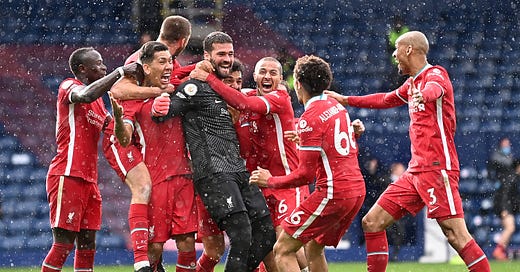Alisson Saves the Season for Liverpool -- and for You and Me
Remember what it was like to feel this way?
There’s a lot I could tell you about the Liverpool–West Brom game. I could tell you about that Liverpool took 26 shots and allowed 10. I could tell you that Liverpool had 76 percent of the possession. I could tell you that Liverpool completed 78 percent of the game’s final-third passes.1 I could tell you their PPDA, a metric that serves as a proxy for pressing. (It was 7.33; that’s a lot of pressing.) I could tell you about the xG: 1.96 for Liverpool to 1.39 to West Brom. I could tell you the score. I could tell you that the final score — Liverpool 2, West Brom 1 — pushed Liverpool’s odds of qualifying for the Champions League next season up from 64 percent to 74 percent.
I could tell you all of that, but I don’t need to. All the matters is right here:
This hasn’t been a Premier League season to remember fondly. That’s subjective, sure, and yes, I am a Liverpool fan. But to me, the journalist who does this for a living, it’s been a slog. Too many games, too close together. The players clearly don’t have the legs for it. The dynamic combination of physicality and technical precision that has defined and elevated the modern version of the game has only appeared in fits and starts. It’s all been slow; the best teams have been even slower.
Jurgen Klopp wasn’t built for this. None of us were, of course; the past 18 months have been brutal for everyone other than Jeff Bezos; the world isn’t the same; the world wasn’t great before the pandemic; but no one is supposed to live like this, faces obscured, skeptical of anyone who’s willing to walk within six feet of your personal circle, forcing yourself away from the people you love. Klopp, in particular, wasn’t meant to live like this. Without emotion and speed and touch and screaming and crying and hugging, Klopp The Football Manager does not exist. You might think that all success stems from controlling both penalty areas. You might think structure in possession is the most important part of the game. Not Klopp, though. “Entertainment is the most important part of football,” he’s said. “There are too many serious problems in the world to make football boring too. I want to see happiness with my players, passion in their eyes and a desire to fight”.
It certainly helps that his stylistic guiding light — heavy-metal football and all that — doubles as perhaps the most effective way to play football. At least, until this year, when the problems of the world made football boring. Everyone on his team is hurt, and even if they weren’t, they wouldn’t be able to run like they used to, like he always wants them to. They’ve been unlucky, but as much as anyone else out there, this Liverpool team isn’t meant to play in empty stadiums. The TVs are on, but there’s no one behind the goal to entertain anymore. Perhaps it’s no surprise that, at best, Liverpool will finish the first full-pandemic season with 30 fewer points than the prior year.
And yet, there’s a reason why this is the game that the world chose, the one that allowed Klopp to fulfill whatever he was meant to fulfill, the one that 12 clubs, including the one he’s coaching, tried to bottle up and monopolize for themselves. Football is nothing without the fans, but so too are the fans without football.
“Modern societies deny men and women the experience of solidarity, which football provides to the point of collective delirium”, wrote the British intellectual Terry Eagleton. “Most car mechanics and shop assistants feel shut out by high culture; but once a week they bear witness to displays of sublime artistry by men for whom the word genius is sometimes no mere hype. Like a jazz band or drama company, football blends dazzling individual talent with selfless teamwork, thus solving a problem over which sociologists have long agonised”.
Eagleton was writing about how the sport is actually an impediment to radical societal change. Perhaps he’s right, but the only reason he’d be right is that there’s something special at the heart of this silly game, 22 people kicking a ball around and constantly failing to score a goal. There’s something that makes all kinds of people feel all kinds of things. For me, that feeling, those feelings, have been few and far between since this season kicked off back in September. But it turns out that not even the world shutting down and raising up all of its awful fractures day after day can extinguish that special thing inside of the round ball. Everything can change, sputter to a stop, seem like it’s over — and then, all of a sudden, a beloved goalkeeper, whose father died just a couple months ago, can save a season with his head. After all, who needs hands? If we wanted that, we’d all be watching something else.
All stats via Stats Perform






What a beautiful testament to a beautiful game, to a beautiful team, to a beautiful moment that made me remember how gorgeous it is to be alive, but more, to FEEL alive.
That was magnificent and I hate Liverpool as a Barça fan